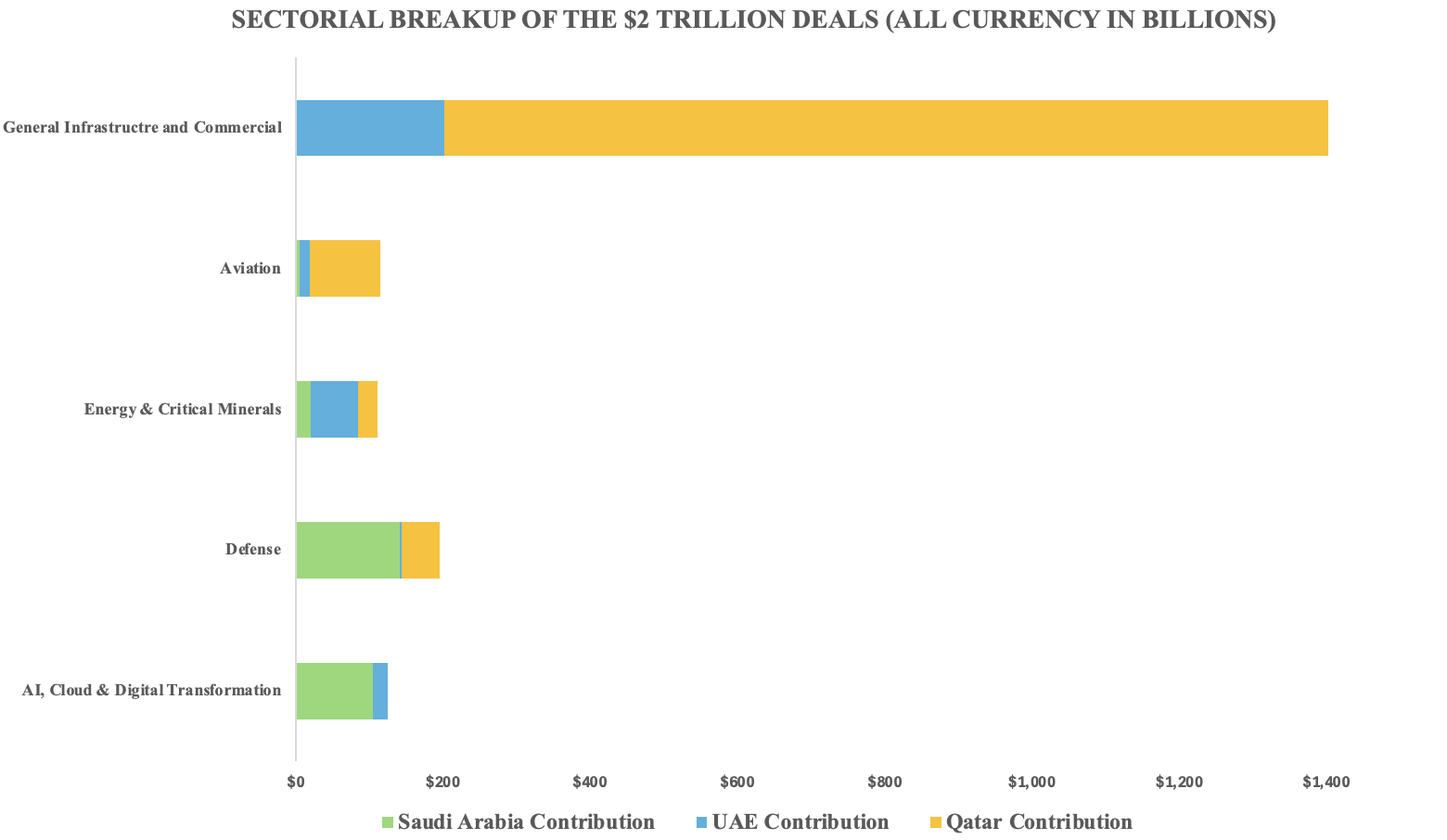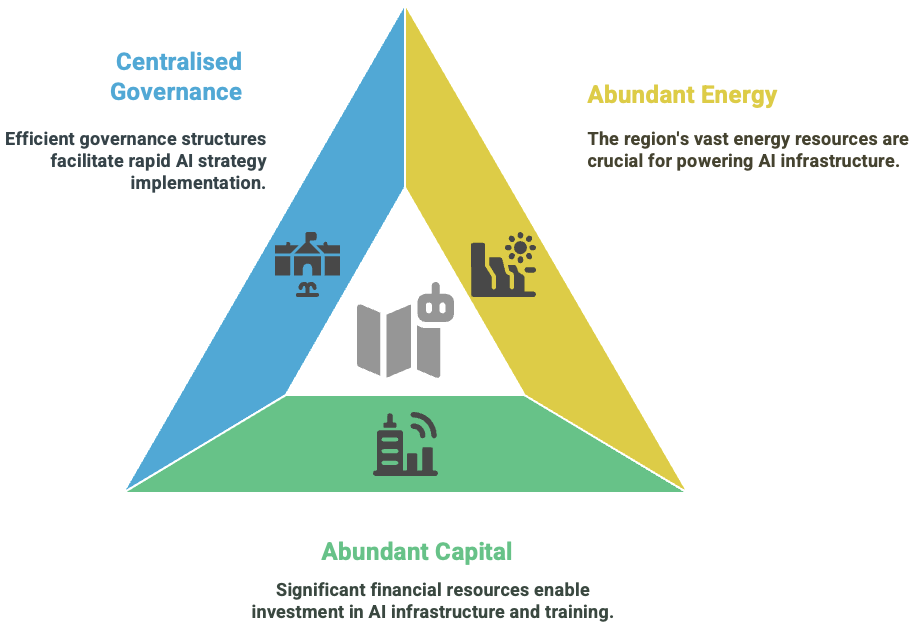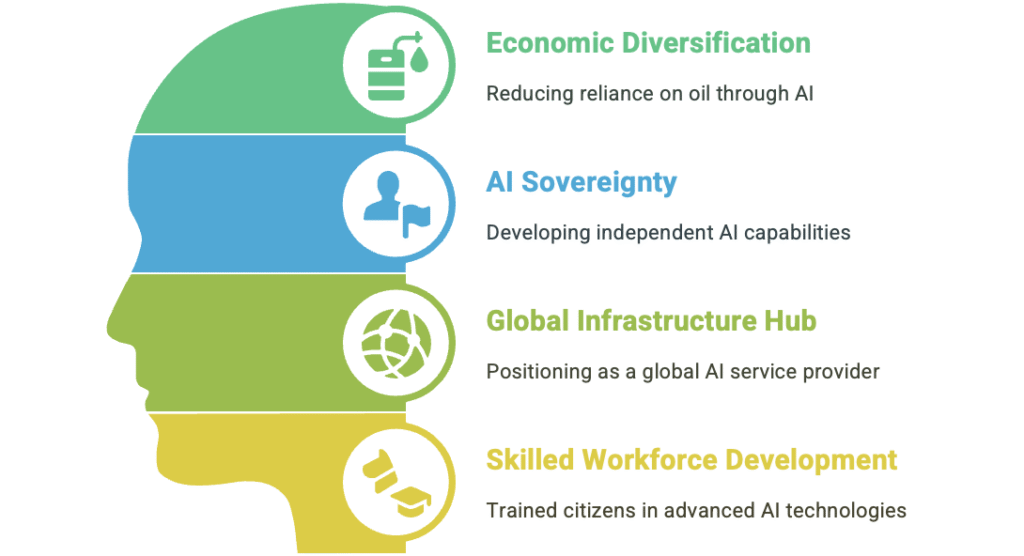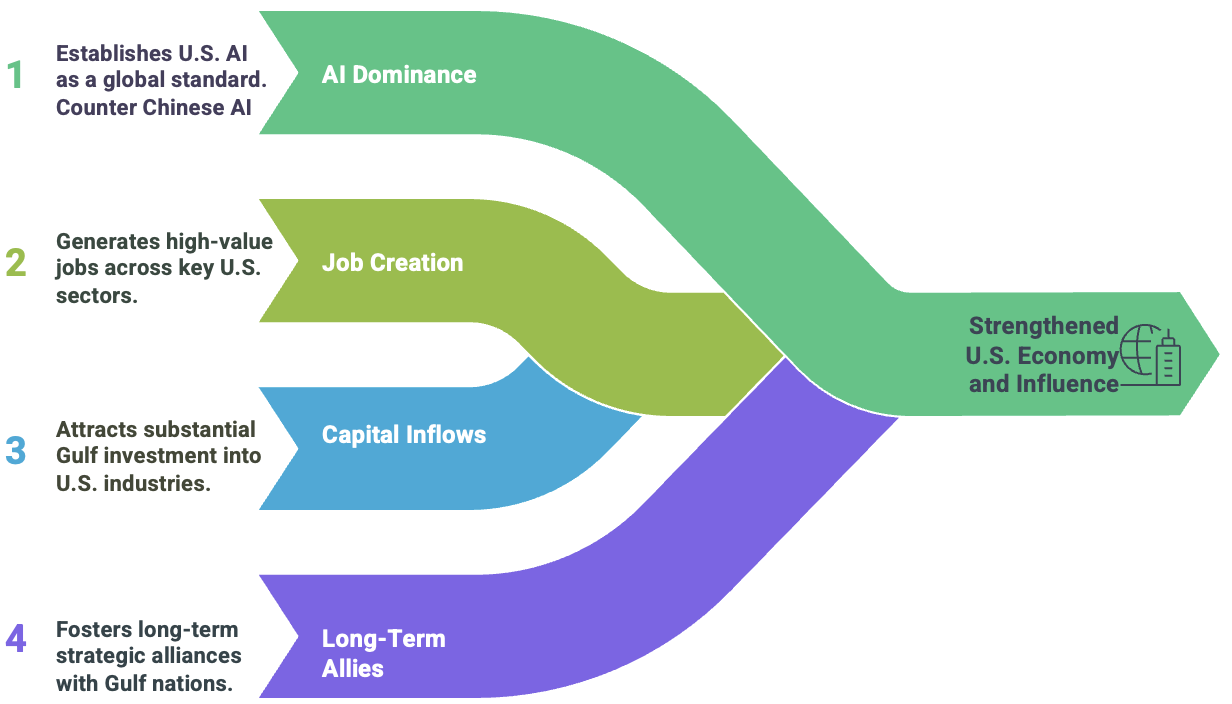Middle East AI push triggered a global tech reset
Within three days, a bold Middle East AI push reshaped the global tech order, thrust sovereign AI to the forefront, and ignited a new wave of techno-diplomacy in geopolitics! In a single diplomatic sweep between May 13 to 16, 2025, deals struck between Saudi Arabia, the UAE, Qatar, and U.S. tech giants led by President Trump reset the trajectory of the global AI landscape, with consequences the entire industry will be grappling with for years. The deals have the potential to transform the Middle East from a hydrocarbon-driven economy into a sovereign AI superpower. The repercussions will extend far beyond the Gulf and North America, reshaping global technology, economics, and digital power structures for years to come.
“In history, the intersection of religion and politics defined centuries. Today, the intersection of technology and geopolitics will set decades in motion.”
Is It Really A $2 Trillion “AI” Shockwave??
The $2 trillion worth of deals coming out of the Middle East is making headlines across the world. But is it really all about AI? Not quite. The massive agreements with Saudi Arabia, the UAE, and Qatar cover much more, including AI compute, cloud infrastructure, sovereign AI ambitions, cross-border investments, defense, energy, and critical minerals. Let us break down these deals and see where AI truly fits in this emerging story.
Well, The AI Deals Are Less Than 10% Of All The Deals!!!
While Middle East AI Push dominates the headlines in the $2 trillion deals, , the reality is that these deals span a wide range of sectors. AI is a key focus and highly strategic, but it represents only a portion of the total. Energy, defense, transportation, and infrastructure also account for significant commitments. The breakdown below shows how these deals are distributed across sectors, and where AI truly stands in this emerging landscape.

Figure: Sectorial Breakdown of the $2 Trillions Middle East Deals
- AI, Cloud and Digital Transformation Deals: AI and cloud deals total ~$125 billion, with Saudi Arabia contributing ~$105 billion and the UAE ~$25 billion. Qatar mentions AI in its $1.2T plan without specifying deal sizes. Apart from this there are advanced chip supply agreement for Saudi Arabia and UAE
- Defense Deals: Defense deals are valued at ~$196 billion, with Saudi Arabia spending ~$142 billion, the UAE ~$1.6 billion, and Qatar ~$52 billion.
- Energy and Critical Minerals Deals: Energy and minerals deals range between ~$110 billion and $130 billion, with Saudi Arabia contributing ~$21 billion, the UAE ~$64 billion, and Qatar ~$26.5 billion.
- Aviation Deals: Aviation deals total ~$115 billion, with Saudi Arabia spending ~$4.8 billion, the UAE ~$14.5 billion, and Qatar ~$96 billion.
- General Infrastructure and Commercial Deals: General infrastructure deals are valued between ~$1.1 trillion and $1.2 trillion, with Saudi Arabia contributing ~$2 billion, the UAE ~$200 billion, and Qatar ~$1.2 trillion.
As seen above the AI and tech deals are less than 10% of the total $2 Trillion deal. However, if AI deals hogged the limelight despite that then there were good reasons for that!!
So What Are The Middle East AI Deals About?
The Middle East deals are a type of economic exchange deals with USA tech giants investing in Middle East Nations and vice versa. To understand their significance, let us first understand the agreements accelerating the Middle East AI Push.
Saudi Arabia AI Deals
- $80 billion pledge by Google, Oracle, Salesforce, AMD, and Uber for advanced digital development projects benefiting both USA and Saudi Arabia.
- $20 billion investment by DataVolt (Saudi firm) to build AI-focused datacenters and energy infrastructure in the U.S.
- $5 billion joint project by AWS and HUMAIN (Saudi Organisation) called “AI Zone” project in Saudi Arabia supporting AWS AI capabilities and training 100,000 Saudi citizens on AI.
- Nvidia to supply 18,000 advanced GPUs (likely GB300 Grace Blackwell 9) to HUMAIN.
- Nvidia partnerships to build AI factories (targeting 500 MW), deploy Saudi Arabia’s first Omniverse Cloud, and collaborate with SDAIA and Aramco Digital on sovereign AI infrastructure.
UAE AI Deals
- $20 billion “UAE Stargate” AI data center project, 1-GW cluster with Nvidia, Cisco, Oracle, SoftBank, Microsoft, and G42. This will be the largest such datacenter outside USA!
- Qualcomm to establish a new Engineer Center in Abu Dhabi.
- “UAE Sovereign Launchpad” initiative, aiming to contribute $181 billion to UAE’s digital economy by 2033.
- Ability to import 500,000 NVIDIA H100 chips annually facilitated by easy USA export restrictions
- Free access to ChatGPT Plus for all UAE residents. A step towards reskilling the whole nation!
Qatar Deals
- AI mentioned as a pillar in Qatar’s $1.2 trillion economic exchange agreement, though no specific AI deal sizes disclosed.
Despite the scale of these agreements, their true impact depends on whether Middle Eastern nations possess the capabilities to fully leverage them. This raises an important question: are these countries genuinely positioned to capitalize on the AI opportunity?
Can Energy Giants Become AI Superpowers?
The scale of the AI agreements is undeniable, but turning potential into impact requires more than capital. It demands readiness in infrastructure, talent, and strategic execution. This section explores whether the Gulf nations have what it takes to fully harness this AI opportunity. We will also explore what it means for the Middle East nations:
Explaining Why the Middle East Nations Are Well Positioned For AI Revolution
The Gulf states possess three structural advantages in the Middle East AI push. These strengths provide a unique foundation for building competitive AI ecosystems. If leveraged effectively, they can help the region bridge capability gaps and translate ambition into sustainable global influence.

Figure: Middle East Advantage In The AI Race
- Abundant Energy: AI data centers are among the most power-hungry infrastructures, and the Gulf enjoys a rare combination of abundant oil, gas, and increasingly solar capacity. This enables them to deliver a reliable, scalable, and cost-effective energy supply that is critical for powering next-generation AI clusters and sovereign compute hubs.
- Abundant Capital: Sovereign wealth funds such as PIF, Mubadala, and QIA provide the Gulf with deep pools of patient capital. This allows them to make long-term, strategic bets on AI infrastructure, sovereign models, foundational research, and talent pipelines.
- State Capacity: Centralized governance structures allow Gulf nations to rapidly prioritize and implement national AI strategies. This enables them to orchestrate large-scale public-private partnerships, mobilize cross-sector coalitions, and accelerate execution cycles in ways that many decentralized democracies find challenging. For example UAE has taken a bold decision to allow AI to write laws for the itself. There are known risks for such initiatives for example AI hallucinations but the centralised governance structure allowed UAE to take the radical move.
So make no mistake, the Middle East AI push can be very much real and it can be revolutionary! It has the ability to transform the fortune of the Middle East Nations. And with them probably the whole world!
So What Does It All Means For The Middle East Nations?
Beyond the headlines and dollar figures, the AI agreements offer the Middle East an unprecedented opportunity to reshape its economic future. If executed effectively, these deals can help the region diversify away from hydrocarbons, build sovereign digital capabilities, and stake a leadership position in the emerging AI-driven global order.

Figure: What Middle East Nations Get From The AI Deals
Driving Economic Diversification
AI and digital investments offer the Gulf states a powerful path to diversify their economies beyond hydrocarbons. By developing globally competitive AI industries, they can reduce dependence on oil revenues and foster sustainable, innovation-driven sectors that will anchor future economic growth.
Building AI Sovereignty
By acquiring advanced U.S. technology, compute, and cloud infrastructure, Gulf states are laying the groundwork for sovereign AI capabilities. This includes developing LLMs tailored to local languages and cultures, building massive sovereign data centers, and creating AI frameworks and governance models on their own terms.
Becoming Global AI Infrastructure Hub
Gulf nations aim to position themselves as global hubs for AI infrastructure. By exporting AI services and compute capacity to Africa, South Asia, and other underserved markets, they can leverage their strategic geographic location and emerging cloud ecosystems to capture regional and global market share.
Developing A Skilled AI Workforce
Investments in human capital are accelerating, with Saudi Arabia getting 100,000 citizens trained in advanced AI technologies and the UAE providing nationwide access to premium AI tools such as OpenAI’s ChatGPT Plus. These initiatives aim to cultivate a broad, future-ready workforce capable of sustaining the Middle East AI Push.
So Why USA Got Interested? And Why Now?
One of the most noteworthy aspect of the deals was how USA rescinded its earlier AI tech diffusion rule. Earlier during Joe Biden era, the rule was aimed to at placing limits on the number of artificial intelligence (AI) chips exported to certain countries without federal approval. The weakening of the rule to ease export of advanced technology to the gulf has it’s own risks. However USA is focusing on some long term strategic gains which are worth a look:
Dominance of USA AI! (Countering Chinese AI)
USA wants the Gulf nations to adopt it’s AI tech stack and not the Chinese ones. Getting allies and adoptions of such tech stake early on can facilitate USA AI becoming global standard and strengthen US AI ecosystem for coming decades. This can effectively help it counter Chinese AI which is trying to make headway globally.

Figure: What the USA gains from the Middle East AI Push
Jobs For USA Citizens
The deals creates substantial demand for U.S. technology, products, and services, driving export growth and generating high-value American jobs across the semiconductor, cloud, defense, and advanced manufacturing sectors. For example the Qatar $96 billion Boeing deal alone is expected to support 1 million jobs in USA for a decade!!
Capital Inflows From The Gulf
The reciprocal investment requirements in the deals unlock significant Gulf investment into U.S. sectors such as technology, energy, critical minerals, and advanced manufacturing, further fuelling U.S. industrial revitalisation and innovation capacity.
Long Term Allies In The Gulf
When the Middle East nations become dependent upon the USA AI technology and USA tech becomes powered by the Middle East investment and energy then the interest of the 2 regions will become deeply intwined creating a long term alignment. This would create divergence costly and strategically disadvantageous for both sides.
But The Picture Is Not All Rosy! The Risks And Mitigations.
Much has been written, talked about and discussed in media panel discussion about the risks which USA has undertaken when it decided to weaken the export restrictions for the advanced technologies. One one hand the deal hands some long term strategic advantage for the USA, on the other hand it also brings following risks and complications:
- Technology leakage: Chinese tech companies have been cultivating relationships with the Middle East nations. There are concerns that the USA advance technology may end up with the Chinese through the Gulf nations. For example earlier Joe Biden administration has asked G42’s to end relation with Chinese firms to get access to advanced US tech.
- Dual-use risks: Advanced chips and AI technologies can be used for civil as well as military applications which may fuel regional tensions.
- Chip shortages: Massive Gulf chip allocations could constrain global AI development. The impact may be seen in unrelated industries like automobiles etc.
- Alignment fragility: Gulf states’ multi-vector diplomacy may test long-term U.S. alignment. If in future their alliances shift then it may have adverse impact for the USA
To mitigate these risks, the U.S. is pursuing a layered strategy:
- USA Tech Giants in Driving Positions: USA hyperscalers like Microsoft, Oracle, Amazon etc. are involved in the management of the data centers. Apart from this USA firms have stakes in many of the key organisations driving the Middle East AI push. For example Microsoft is a key stakeholder in G42 which is driving the UAE AI ambitions.
- Deep Economic Interdependence: Through the reciprocal investment requirements and ensuring the gulf uses USA hardware, software, platforms and standards, USA is developing deep economic interdependence. This is to ensure that any divergence will be prohibitively costly.
So How Does It Rewrite The Rules For The Whole Globe?
The repercussions of the Middle East AI push will extend far beyond the region. The “Silicon-craft” of those 72 hours is already reshaping global dynamics around techno-alliances, AI governance, emerging power hubs, and regulatory approaches. Nations around the world will need to recalibrate their AI strategies and policy frameworks to adapt to this new reality. Here are some of the key global shifts set in motion by the Middle East AI push:
Emergence Of A New AI Gateway (Especially for the Global South)
The Middle East is emerging as a key AI gateway for the Global South. With its geographic advantage, sovereign compute capacity, and expanding cloud ecosystems, the Gulf can provide AI infrastructure and services to Africa, South Asia, and other underserved regions. This shift will reshape digital dependencies and AI access patterns. The Middle East ambition to control compute power and sovereign is establishing new rules for what constitutes national power in the rapidly evolving digital age.
For example after the G42 deals the most powerful A.I. training facility in 2029 would be in the United Arab Emirates, rather than the United States. Therefore the countries around the world will now have to decide how to react!
Fragmenting AI Governance: The Multipolar AI World Is Official Now
Perhaps the most profound long-term impact of the Middle East AI deals lies in the realm of AI governance. The multipolar AI world is now reality. We are witnessing the emergence of distinct AI zones:
- USA AI Stack: This is driven by USA hardware (Nvidia Chips), running on US platforms led US hyperscalers (AWS, Microsoft, Oracle, Google), running using USA software (e.g. OpenAI) running using USA talent.
- Middle East AI: This is aligned to USA on hardware, software and platforms but has it’s own flavour of standards based on local culture, language and value systems. The initiatives about Arabic language LLM is one such example showing the direction of the Middle East AI push.
- Chinese AI: Chinese chip makers like Huawei and software players like DeepSeek are trying to create an alternative to the USA standards. DeepSeek with it’s low cost AI training impact has already shown it’s potential.
- European AI: Europe has long prioritized sustainable technology adoption, balancing innovation with strong regulatory oversight. This approach is reflected in landmark policies such as GDPR and the EU AI Act, which exemplify Europe’s commitment to building an AI ecosystem grounded in ethics, privacy, and long-term societal sustainability.
- AI for Emerging Nations: Emerging nations like India have their own AI ambition. The the Middle East AI push will force them to recalibrate their own decisions. They may now have to accelerate their own AI journey and also have to decide which AI stack they chose.
The Chinese May Attempts At Similar Deals!
Chinese policymakers recognize that the primary driver behind the U.S. decision to ease AI diffusion was the growing influence of Chinese AI capabilities. In response, Chinese firms may seek to forge similar strategic AI partnerships. However, in the short to medium term, a large-scale counterplay appears unlikely. The U.S. still dominates advanced semiconductor technology, such as lithography, which remains a key bottleneck for China. Chinese chipmakers are not yet positioned to export advanced AI chips at scale. Nevertheless, Chinese firms may pursue partnerships with smaller, ambitious nations as an initial step to expand their AI footprint.
The AI Challenge for Europe
European decision makers have always considered themselves as one of the three economic and technological superpowers (USA and China being the other two). However, So far Europe has not been able to build such a massive AI infrastructure like the Gulf countries are. With the Gulf countries choosing speed and agility over caution, Europe would have to re-evaluate it’s caution driven AI approach.
Impact of Africa: A New gateway To AI
The Gulf’s geographic position makes it an ideal AI gateway for Africa. Already, Gulf cloud providers and sovereign data centers are positioning themselves to export AI compute and services to Africa’s rapidly growing digital markets.
However, it also raises questions of digital sovereignty as Africa may become passive consumers of Gulf-controlled platforms?
Lessons For Emerging Nations (Like India)
For emerging nations like India, the Middle East AI push is both a wake-up call and an opportunity. Without sovereign AI infrastructure, even nations with top AI talent risk becoming service layers in foreign AI ecosystems. Gulf-exported AI presents both dependency risks and a chance to collaborate and expand IT service exports.
Key Takeaway For Global Decision Makers
The Middle East AI push has some clear messages for the decision makers globally:
- Sovereign AI is becoming critical. Prepare for more regulations: AI is the new oil and data centers are the new military based. Invest in sovereign AI as it is also the gateway to influence. Different nations having difference AI may led to multiple regulations.
- Invest in AI infrastructure, AI talent is not enough: AI is operated by people but it runs in massive data centers, powered by advanced chips and operates on Large Language Models (LLMs). Without these critical infrastructure no nation can be an AI power.
- AI Governance Gaps Will Widen. Monitor emerging standards: As AI becomes increasingly fragmented across geopolitical blocs, leaders must prepare for diverging norms, ethics, and governance frameworks shaping the global AI landscape.
- AI geopolitics is accelerating, stay alert: Techno-alliances, Silicon-craft, AI infrastructure, and talent flows are now key levers of geopolitical influence in the AI era.
Conclusion
The 72 hour Middle East AI push is not just about chips and cloud contracts. It is a fundamental shift for the global AI doctrine where AI is the new oil and data centers are the new military bases. As the Gulf transforms into a sovereign AI hub, the world must prepare for an AI landscape that is multipolar, geopolitically charged, and deeply entwined with global power politics.
